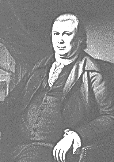
Robert Morris
Though he died penniless, Morris showed genius in finance.
He laboured for the cause, even borrowed money from France.

Morris saw to the financing of the Revolutionary War, almost single-handedly.
English-born Robert was educated a short time at
Philadelphia until he lost his father when he was only fifteen. Being an
orphan and on his own, he joined a shipping firm
as a youth and worked his way into success. He married Mary White in 1769
with whom he had several children: Robert, Thomas,
William White Morris,
Hannah Seely Morris,
Hester,
Charles,
Maria,
Martha,
Henry, and Frank John Morris.
He was an Anglican who worshiped in
St. Peters on Pine Street. After his brother-in-law Reverend William
White started a branch of the Episcopal Church in Philadelphia, Morris worshiped
at Christ Church on 2nd Street. His pew was just a few seats away from
Washington's. Wikipedia
Being elected to Congress in 1775, he worked with others to raise capital and juvament for the Continental Army. Early in 1776, Morris was given authority to negotiate bills of exchange for the operation of the war. It was to him that General Washington, then with his army on the Delaware, sent a letter about his desperate situation and need for money, specifically ten thousand dollars to follow movements of their adversary. Morris loaned $10,000 of his own money to the government with which the troops were able to go on to win the Battle of Trenton. Throughout the war he personally underwrote the operations of ships that ran the British Blockades at great risk to bring needed supplies into the colonies for the destitute army.
In 1781, Morris was appointed by unanimous vote of congress to be superintendent of finance, an office then for the first time established. They believed firmly he was most deserving of the job as they long remembered the admirable way he expediently obtained supplies under trying circumstances. This job was a difficult one for that time as the treasury was more than two and a half million dollars in arrears, most of which could not be overlooked or even delayed. Ben Franklin did his part to help but distress continued. Public credit was not an option which was to the delight of England. Our public officers had long worked without pay and were depending on back salaries to help overcome shortages and sufferings of the war. Some of them were sentenced to debtors' prison for they could not pay back bills they had run up for bare necessities. The army had long subsisted on too little. Paper bills were near worthless. To all this, Morris diligently and carefully worked out solutions.
He established the bank of North America, which soon exerted benefits for the public good. Credit was again available, paper could be converted into silver or gold when needed, and general trade became active. Vaults in the bank were trusted, money was deposited, and perceptions of doom were turned into those of hope. America, tottering but not trembling, was able to push ahead to win the decisive battle against Cornwallis.
In April, 1783, Alexander Hamilton wrote to George Washington, "But Mr. Morris certainly deserves a great deal from his country. I believe no man in this country but himself could have kept the money machine a-going during the period he has been in office."
In 1789, President George Washington appointed Morris to be Secretary of the Treasury, but Morris declined the office and suggested Alexander Hamilton instead. After completing his office as Senator, he retired from public service, never to recover the wealth that he earned before the revolution. Sadly, he spent time in debtors prison until Congress passed bankruptcy laws.
He died in 1806 at 73 years old and was buried in the family vault of Bishop William White, his brother-in-law, at Christ Church.
http://laughtergenealogy.com/bin/histprof/founders/const/morrisr.html
Rev. Charles A. Goodrich Lives of the Signers to the Declaration of Independence. New York: William Reed & Co., 1856. Pages 233-244. Robert Morris University is in Moon Township, Pennsylvania. Robert Morris College is in Chicago, Illinois; Robert Morris Elementary School, Batavia, NY; Robert Morris Elementary School #27, Scranton, PA; Robert Morris Elementary, Philadelphia, PA.
Mount Morris, New York, where there is a large flood control
dam on the Genesee River, was named in honor of Robert Morris.
Several Navy/Coast Guard ships have been named USS Morris or
USRC Morris for him.
Morrisville, Pennsylvania, is named after Robert Morris where
a statue of him resides in the town square.
The Robert Morris Inn in Oxford, Maryland, is named after
him.
http://www.robertmorrisinn.com/history.html
In a memorial along the Chicago River, George Washington, in his Revolutionary War uniform, is shown with Robert Morris and Hyam Salomon, two men who raised thousands of dollars to assist the American Army.
Robert Morris's home in Philadelphia served as the "White House" from 1790 to 1800 for Presidents Washington and John Adams, while Philadelphia was the temporary U.S. capital during the construction of Washington, D.C. The building no longer exists, but the site will is to become a memorial, not to Morris or to other famous residents before him, but to Washington's black slaves.
Not that I speak in respect of want: for I have learned, in whatsoever state
I am, therewith to be content.
I know both how to be abased, and I know how to abound: every where and in
all things I am instructed both to be full and to be hungry, both to abound and
to suffer need.
Phil 4:11-13